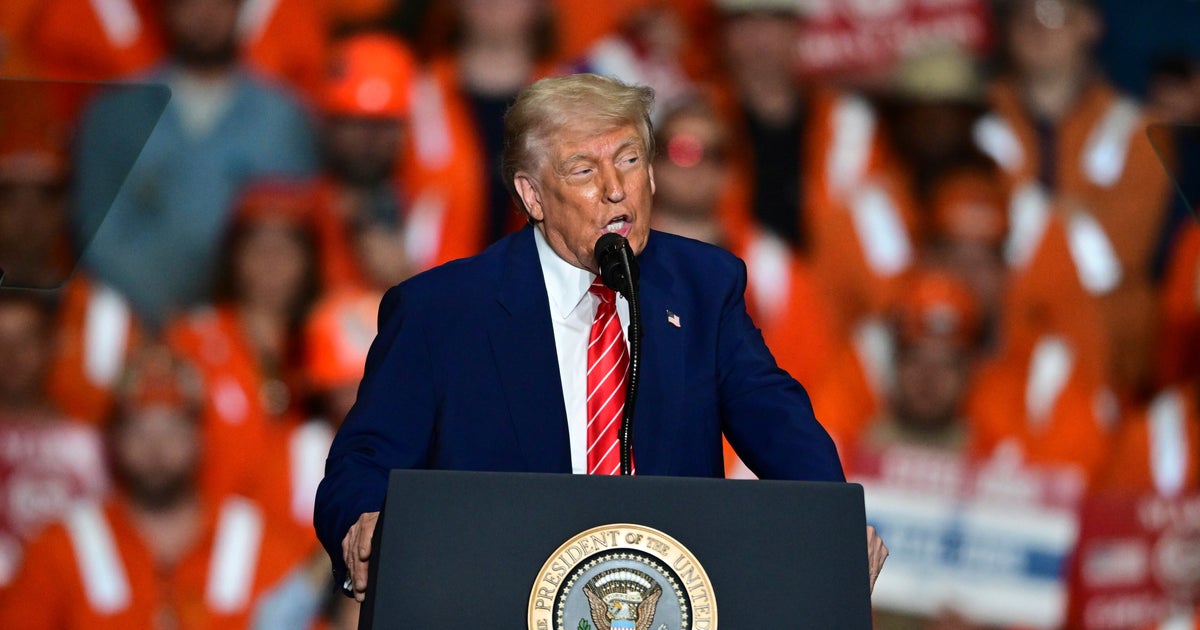
President Trump announced that he would be doubling tariffs on steel to 50% as he visited a U.S. Steel mill in the Pittsburgh suburbs Friday, a week after teasing a “planned partnership” between the company and its Japanese competitor Nippon Steel.
“We are going to be imposing a 25% increase. We’re going to bring it from 25% to 50% the tariffs on steel into the United States of America, which will even further secure the steel industry in the United States,” he said.
Mr. Trump later noted on his Truth Social platform that the increase would also be applied to aluminum, and would take effect on June 4.
The Nippon deal will allow U.S. Steel’s headquarters to remain in Pennsylvania, according to Mr. Trump, who characterized the agreement last Sunday as “an investment” and “partial ownership” that will be “controlled” by the United States. The administration, however, has released few details about the deal.
“We’re here today to celebrate a blockbuster agreement that will ensure this storied American company stays an American company,” Mr. Trump said Friday.
Mr. Trump’s announcement last week was the latest twist in Nippon’s yearslong effort to acquire U.S. Steel. Its nearly $15 billion bid to buy U.S. Steel was blocked by former President Joe Biden in January on national security grounds.
Mr. Trump, who opposed the acquisition during the 2024 campaign, has since warmed to a deal between the steel producers, touting a $14 billion investment that the president said would “create and save over 100,000 American jobs.”
“You’re going to be very happy,” Mr. Trump said Friday. “There’s a lot of money coming your way.”
Mr. Trump said the deal includes “vital protections to ensure that all steel workers will keep their jobs and all facilities in the United States will remain open and thriving.” He added that U.S. Steel would also keep all of its blast furnace facilities at full capacity for at least the next decade and vowed that there would be “no layoffs and no outsourcing whatsoever.” Every worker at U.S. Steel would soon be receiving a $5,000 bonus as well, he said.
Mr. Trump said he approved a deal after the persistence of Nippon, whose offer kept getting “better and better” each time the company made another proposal.
Later Friday night, after returning from his visit, Mr. Trump told reporters he has to approve the final deal with Nippon, and that “we haven’t seen that final deal yet.”
Sen. David McCormick, a Pennsylvania Republican, provided more details on the agreement in an interview with CNBC on Tuesday, saying that U.S. Steel would have an American CEO and a majority of its board members will be from the U.S., an arrangement that was also part of the deal rejected by Biden.
McCormick did raise one potential difference in the latest iteration, stating that the U.S. would have a golden share.
“It’s a national security agreement that will be signed with the U.S. government,” McCormick said. “There’ll be a golden share, which will essentially require U.S. government approval of a number of the board members and that will allow the United States to ensure production levels aren’t cut.”
McCormick said Nippon will have “certainly members of the board, and this will be part of their overall corporate structure.”
“They wanted an opportunity to get access to the U.S. market — this allowed them to do so and get the economic benefit of that,” McCormick said of Nippon. “They’ve negotiated it, it was their proposal.”
It is not yet clear whether the golden share provision involves any U.S. ownership of the merged companies.
The United Steelworkers union has opposed a sale, arguing that the Japanese company is making “flashy promises” that put American jobs at risk.
In a statement Friday, union president David McCall said the group was not included or consulted in the discussions “so we cannot speculate about the meaning of the ‘planned partnership’ between USS and Nippon or the ‘golden share’ that some politicians have claimed will be issued to the federal government.”
“There is a vast difference between public relations and putting commitments in writing, just as there is a vast difference between allowing shareholders and executives to cash-out and putting workers’ interests first,” he said. “Any final deal that may emerge from discussions between the merger parties and the federal government must be viewed through that lens, and not the lens of wishful thinking that has been adopted by far too many politicians and others.”
But without an acquisition, U.S. Steel had warned last year that the company would “largely pivot away” from its blast furnace facilities, which would put thousands of jobs in jeopardy. The company said the future of its headquarters in Pittsburgh was also uncertain without an agreement.
U.S. Steel employs about 22,000 people, with more than 14,000 employees in North America and the rest in Slovakia.